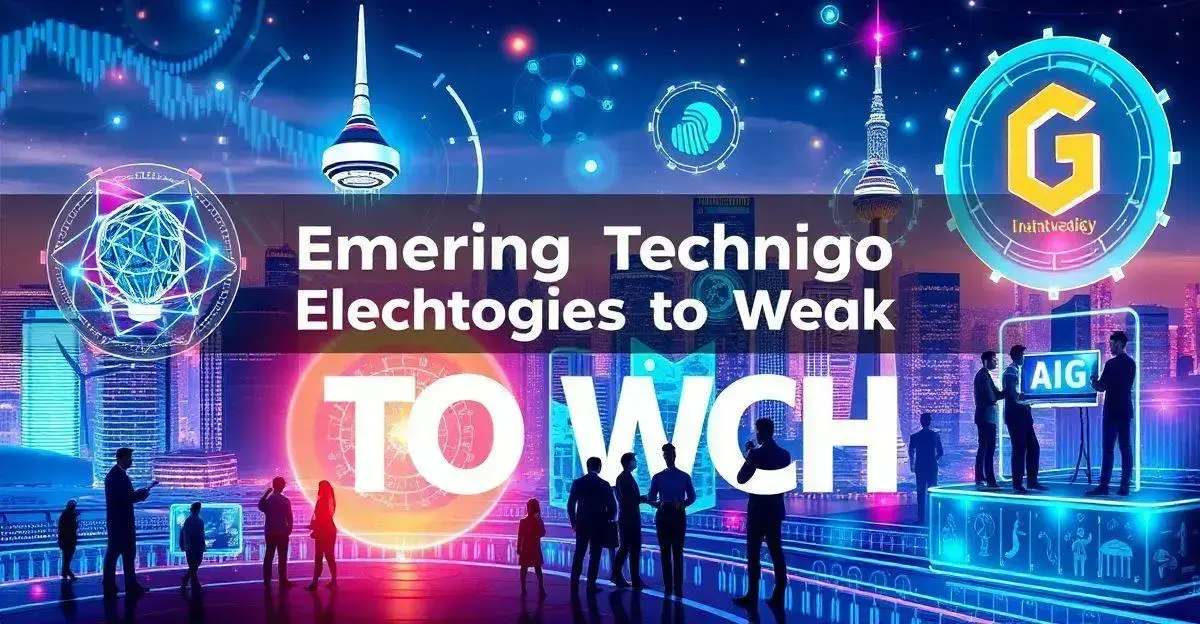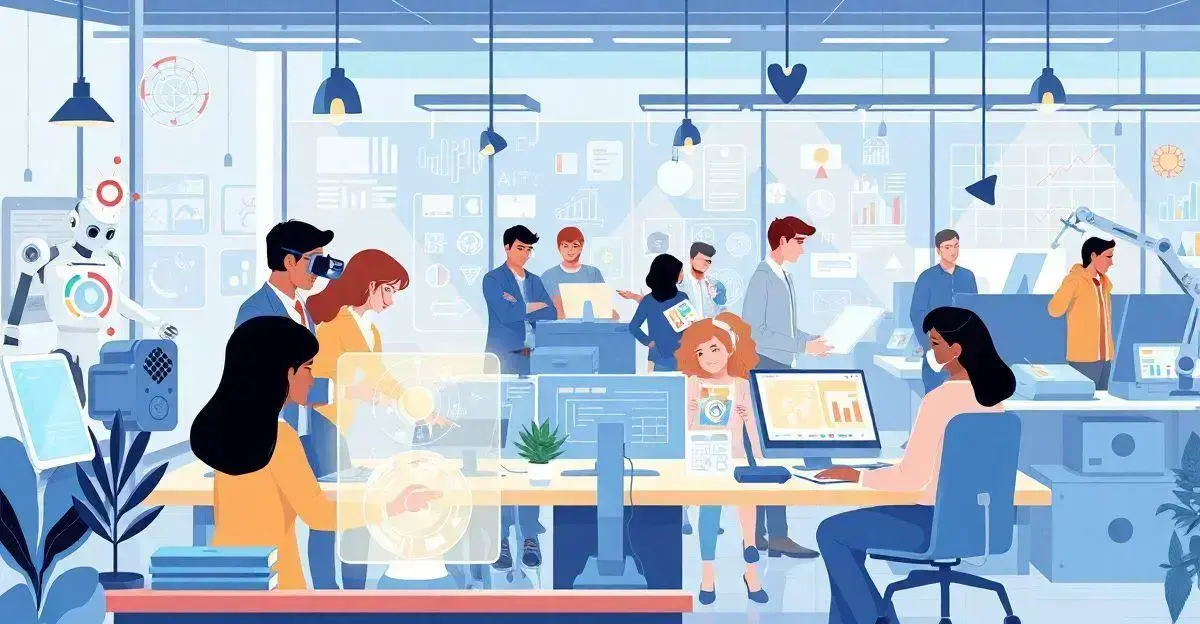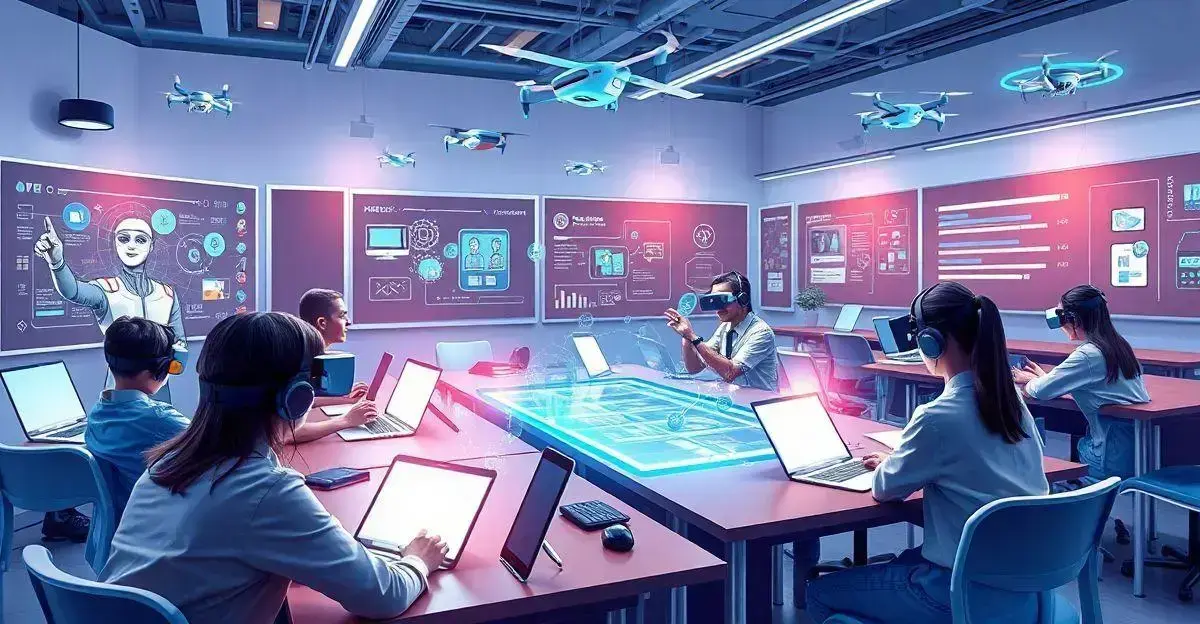Emerging technologies are at the forefront of innovation, driving change across multiple sectors.
As these technologies evolve, they not only create new opportunities but also challenge existing structures.
Introduction to Emerging Technologies
Emerging technologies are defined as new innovations that significantly alter the way we live and work. Understanding these technologies is essential, as they hold the potential to reshape industries and improve quality of life.
Examples of emerging technologies include artificial intelligence, blockchain, and the Internet of Things (IoT). Each of these technologies is unique and brings its own set of challenges and opportunities.
For instance, artificial intelligence is revolutionising various fields, from healthcare to finance, by enabling machines to perform tasks that typically require human intelligence. Blockchain technology provides a secure way to conduct transactions and store data, changing how companies approach data integrity.
The Internet of Things provides a network of connected devices that communicate, making data collection more efficient and processes more automated.
It is important for individuals and organisations to stay informed about these trends, as adopting emerging technologies can lead to increased efficiency, enhanced competitive advantage, and innovative solutions to existing problems.
By exploring how these technologies can be integrated into their operations, businesses can harness the potential of what’s to come.
Top 5 Emerging Technologies to Watch

Staying informed about the top emerging technologies can give individuals and businesses a significant advantage.
Here are five technologies that are making waves today:
- Artificial Intelligence (AI): AI systems are becoming more intelligent and can analyse data, make decisions, and even learn from experiences.
This technology is being used across various sectors to enhance efficiency and provide insights. - Blockchain: Originally designed for cryptocurrency, blockchain technology offers a secure way to record transactions and share information.
Its applications are expanding into fields like supply chain management and healthcare. - Internet of Things (IoT): IoT refers to the network of interconnected devices that communicate with one another.
This technology can improve processes across industries by enabling better data collection and automation. - Augmented Reality (AR): Enhancing the real-world environment with digital information, AR is being used in gaming, education, and retail to create immersive experiences.
- 5G Technology: The rollout of 5G networks is set to revolutionise communication, enabling faster speeds and more reliable networks for both individuals and businesses.
Understanding these technologies allows businesses to not only keep pace with competition but also to innovate effectively. By integrating these technologies, companies can improve their operations and better serve their customers.
The Impact of Emerging Technologies on Business
The impact of emerging technologies on business is both profound and transformative. Companies today are harnessing innovation to optimize operations, improve customer experiences, and drive growth.
For example, artificial intelligence streamlines processes by automating routine tasks, freeing employees to focus on more strategic responsibilities. This shift not only boosts productivity but also enhances employee satisfaction.
Big data analytics enables businesses to gain valuable insights into customer behavior, preferences, and trends. By understanding these factors, companies can better tailor their offerings to meet customer needs, leading to more effective marketing strategies and increased revenue.
Cloud computing has also become essential, offering businesses the flexibility to access data and applications from anywhere. This capability supports remote work and collaboration, which has gained importance in a post-pandemic world where many companies have adopted hybrid working models.
Blockchain technology, with its enhanced security and transparency, adds another layer of trust to business transactions. By reducing costs associated with fraud and errors, blockchain helps businesses build stronger relationships with customers and partners.
In summary, embracing emerging technologies is no longer optional; it is essential for businesses that want to stay competitive and sustainable in today’s fast-paced market.
Emerging Technologies in Healthcare

Emerging technologies are significantly transforming healthcare, enabling better patient outcomes and operational efficiencies. Telemedicine, which allows patients to consult with healthcare professionals remotely, is one impactful area. This is particularly beneficial for individuals in rural areas where access to healthcare services may be limited.
Another important technology is artificial intelligence (AI). AI can analyse vast amounts of medical data quickly, assisting doctors in diagnosis and treatment planning. For instance, AI algorithms can identify patterns in medical imaging that may be difficult for the human eye to spot.
Wearable technology is also on the rise, providing real-time health monitoring for patients. Devices like smartwatches can track heart rates, sleep patterns, and physical activity levels. This data helps patients stay informed about their health and encourages proactive management of chronic conditions.
Additionally, robotic surgery is revolutionising the way surgeries are performed. Robots assist surgeons in performing precise movements, which can lead to quicker recovery times and less pain for patients.
Finally, blockchain is paving the way for improved data security and patient privacy in healthcare. By securely storing patient records, it enhances trust between patients and healthcare providers.
These technologies are not just innovations – they are essential tools for improving healthcare delivery and enhancing patient care.
Environmental Implications of Emerging Technologies
The rise of emerging technologies comes with significant environmental implications. It is essential to consider how these innovations impact our planet. For instance, the use of artificial intelligence can lead to more efficient resource management, which helps reduce waste and energy consumption.
By analysing data, AI systems can optimise energy use in buildings and industries, making processes more sustainable.
However, the production and disposal of tech devices raise concerns. Many electronic products contribute to e-waste, which can harm the environment if not recycled properly. Therefore, it is crucial for companies to adopt circular economy practices that emphasise recycling and reusing materials.
Similarly, the growth of blockchain technology can help in supply chain transparency, ensuring that companies use sustainable practices. By tracking the origin of products, businesses can make informed decisions that promote environmental responsibility.
Emerging technologies like renewable energy solutions, such as solar panels and wind turbines, are also invaluable. They offer a way to mitigate climate change by reducing reliance on fossil fuels, thus decreasing greenhouse gas emissions.
Finally, it is essential for regulators to create guidelines that ensure emerging technologies are developed with environmental sustainability in mind, promoting innovation while protecting our planet.
Future of Work: Adapting to New Technologies

The future of work is being shaped by emerging technologies that require adaptation from both employees and employers. Technologies such as artificial intelligence, remote collaboration tools, and automation are transforming job roles and the skills needed in the workplace. Understanding these changes is essential for staying competitive.
Artificial intelligence is automating repetitive tasks, freeing employees to focus on more strategic and creative responsibilities. For example, AI can handle data analysis, allowing team members to interpret the results and make informed decisions without getting bogged down in calculations.
Moreover, remote collaboration tools enable teams to work effectively from anywhere. Platforms like Zoom and Slack have become vital for communication and project management, breaking down geographical barriers. This flexibility allows businesses to tap into global talent.
In addition, upskilling is becoming increasingly important. Employees must continually learn to keep pace with technological advancements. Companies that invest in training programs see improved productivity and employee satisfaction.
Finally, diversity and inclusion are enhanced in a technology-driven work environment. AI can help reduce bias in hiring practices, ensuring that opportunities are accessible to a wider range of candidates.
Adaptation to these changes will determine the success of organisations in the future workplace. Embracing technology, investing in skills, and fostering an inclusive culture are key strategies for thriving in this evolving landscape.
The Role of AI in Emerging Technologies
Artificial Intelligence (AI) plays a significant role in the development of emerging technologies. By facilitating automation, AI enhances operational efficiency across various industries. It helps organizations analyse large datasets, enabling quicker and better decision-making.
For instance, AI-powered tools can provide insights into consumer behaviour, allowing businesses to tailor their strategies accordingly.
In the field of healthcare, AI is used for diagnosis through advanced imaging techniques. Machines can identify potential illnesses faster than medical professionals, leading to prompt treatment.
Additionally, AI contributes to the creation of smart technologies that interact seamlessly with users. From virtual assistants like Siri to recommendation systems on streaming platforms, AI shapes user experiences.
However, while AI brings many advantages, it presents challenges, including ethical considerations and the need for responsible use. As AI technologies become more widespread, stakeholders must ensure that they are implemented in ways that enhance society while minimizing harm.
In summary, the role of AI in emerging technologies is multifaceted, driving innovation while also requiring careful management to address its implications.
Emerging Technologies in Education

Emerging technologies are reshaping education in exciting ways.
Artificial Intelligence (AI) is enhancing personalised learning experiences for students. By analysing data on individual learning styles and preferences, AI can provide tailored resources and activities that suit each learner’s needs.
Virtual reality (VR) immerses students in rich, interactive environments that make learning more engaging and effective. For example, history students can explore ancient civilisations through virtual field trips, while science classes can conduct experiments in a safe digital lab.
Moreover, online learning platforms allow access to a wealth of resources and courses from anywhere in the world. This flexibility enables learners to study at their own pace and revisit materials as needed, contributing to better understanding and retention.
Additionally, gamification in education motivates students by incorporating game elements into learning. This approach encourages participation and fosters a positive learning atmosphere.
Finally, the use of data analytics helps educators track student performance and identify areas for improvement. By examining trends in student data, schools can implement targeted interventions to support struggling learners.
In conclusion, emerging technologies are transforming education, making it more accessible, engaging, and effective for all learners.
How to Stay Ahead in an Ever-Changing Tech Landscape
Staying ahead in an ever-changing tech landscape requires a proactive approach to learning and adaptation. Continuous education is pivotal. Engaging in workshops, online courses, and conferences can keep you informed about the latest trends and tools.
In addition, developing critical thinking skills can help you evaluate new technologies effectively. Understanding the potential impacts, both positive and negative, is essential in making informed decisions.
Networking with professionals in your field can also provide insights into how others are adapting to changes. Joining professional groups or attending meetups can foster valuable connections.
The use of data analysis tools can help you predict trends and customer needs, allowing you to respond quickly to changes in the market. Familiarising yourself with these tools can give you a competitive edge.
Finally, maintaining a flexible mindset is crucial. Being willing to pivot when necessary, or to adopt new technologies, allows you to stay relevant and innovative in your field.
FAQ – Frequently Asked Questions about Emerging Technologies
How can Artificial Intelligence improve business operations?
AI can automate tasks, analyse data, and enhance decision-making processes, leading to increased efficiency and productivity.
What role does blockchain play in supply chain management?
Blockchain provides transparency and security in transactions, allowing businesses to track products from origin to delivery.
How does IoT benefit everyday life?
IoT connects devices, enabling smarter home management, better healthcare monitoring, and improved energy efficiency.
What is the significance of online learning platforms for education?
Online platforms provide accessible and flexible learning opportunities, allowing students to study at their own pace and revisit materials.
How can businesses stay updated with emerging technologies?
Engaging in continuous education, attending industry conferences, and networking with professionals are effective ways to stay informed.
Are there risks associated with emerging technologies?
Yes, challenges such as data privacy, security concerns, and the potential for job displacement require careful management and ethical considerations.
